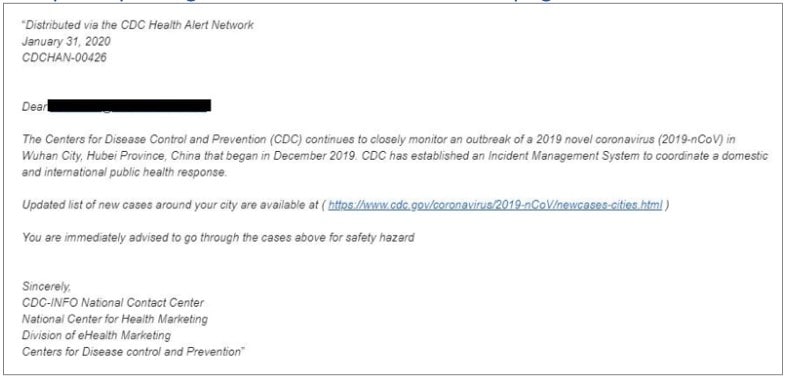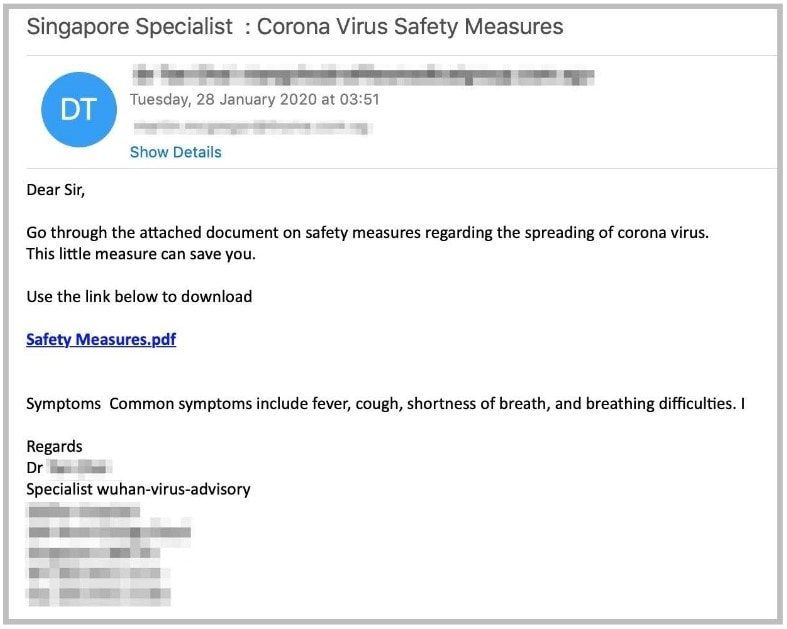Tricks and scams come along with any big incident — that’s almost a sure thing, perpetually related to human nature (bad nature) and the Achilles’ heel of human beings as a whole.
Frauds, ruses, traps, baits, whatever you call them, are never going to leave you alone, especially in this unprecedented pandemic season.
Since the start of the plague, I have been watching closely not only the striking numbers every day, but also fraudsters’ performance worldwide.
Here are some of the most common COVID-19 scams the world has seen, nothing new really but effective as usual.
Actually all those scams can be categorized into two prototypes, so to speak, namely, fake goods, and phishing attempts. The fraudsters are targeting at two things of yours, your money, or your information.
As simple as that.
1. Fake masks and hand sanitizers.
It’s self explanatory but hard to spot in time of this, when PPE’s are in short supply and high demand.
The Strait Times reported a case where a company had transferred money to buy surgical masks but the goods were never delivered and the supplier became unaccountable.
*Read the news: Man arrested for money-laundering offences linked to $10.3 million Covid-19-related scam
Tips for you:
Buy on big and formal e-commerce websites, be wary of legitimacy and credibility of the vendors.
2. Phishing for your personal information
Phishing can be in many forms, text message, Whatsapp, WeChat, email, etc.
It is one of the oldest and most obstinate scams that has seen its heyday in the 1990s when email was still a novelty.
It evolves too with the advancement of technology and how we communicate with others.
I have read in The Fraud Magazine (Vol.35, No.3, May/June 2020) an article written by Robert E. Holtfreter, PH.D., CFE, which related two types of scams using text messages from FedEx (impersonated of course) to ask package consignees to provide personal information willingly on a fake Amazon webpage, with a bait of prize after completing a customer survey.
Another ruse used fake FedEx delivery message to allure consignees who were worried about their ordered goods into clicking on a baiting link so that malwares got installed on the clickers’ devices to steal their information.
Tips for you:
No matter what, be careful of what you are going to click.
The hinge of all phishing scams lies in the link camouflaged as real — that’s the key.
If you don’t click on it, the trick can’t work on you.
Phishing, per se, is a huge categorical term. This article only touches upon those related to COVID-19.
Common phishing attempts are in the following forms (based on our observation and real cases):
-
COVID-19-themed phishing messages pretending to be from the CDC (any CDC of your locations or health authorities)
Such emails easily catch your attention because the three letters (CDC) represent THE authority amidst this plague right now.
It “warns” you there is a new case near where you are or concerned about. You click to “know more” and you are hooked.

*sample picture from https://us.norton.com/internetsecurity-online-scams-coronavirus-phishing-scams.html -
Phishing messages can pretend to be from health authorities or doctors, offering safety measures or health advice.

-
Phishing links can be asking you to install apps or softwares to “protect” you from the virus.
*Picture from https://www.welivesecurity.com/2020/05/01/no-time-let-your-guard-down-coronavirus-fraud-rampant/ -
Phishing can be in the name of charity, asking you for donation to hospitals.
There are many more derivative forms of phishing scams, either via email or social media, and there can be many more precaution tips, but let me put it simple and clear — do these two things and you will be safe from most of them.
- Scrutinize the email address and the link – watch out for minor differences in spelling.
- Be alert to any request for your PII (personally identifiable information), such as your credit card etc.
To sum it up, there are an array of scams and ruses floating in both the real and virtual world, in the past, right now, and into the future.
They won’t go away and there is not a silver bullet that kills them all.
But if you get the knack of the tricks, you will know how to stay away from them.
Remember this:
- The best way to prevent illness is to avoid being exposed to the virus.
-
The best firewall to protect your money and information is your awareness.
Stay safe and away from both the virus and the scams.
Let’s hope both our world and you get back to normal soon, safe and sound.






